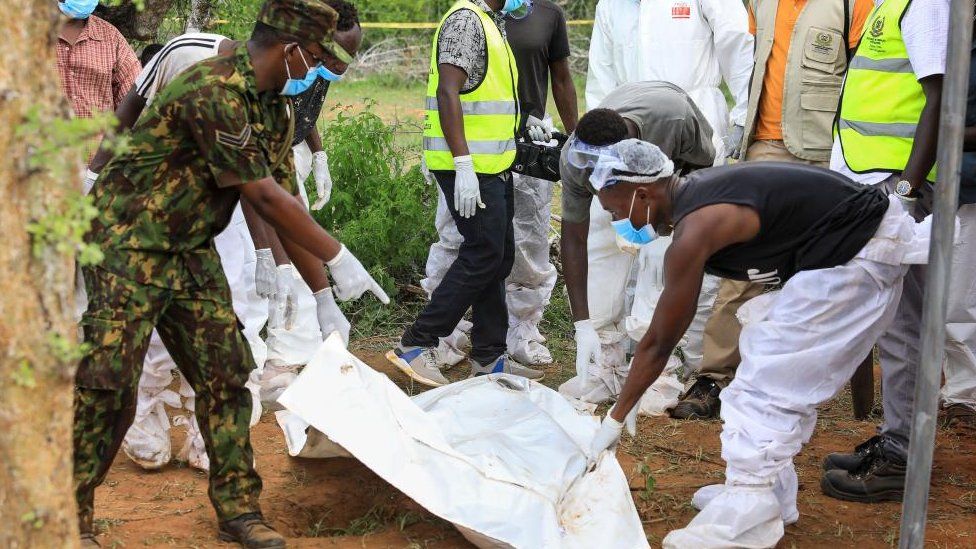ARTICLE AD BOX
 Image source, EPA
Image source, EPA
Detectives and forensic experts began examining the site on Friday
In the middle of a forest not far from Kenya's coast, piles of fresh earth topped with crucifixes await the attention of forensic experts.
About 14 mass graves have so far been dug up and Hussein Khalid has spent the past four days watching people exhume dozens of bodies.
"The stench is unbearable," he tells the BBC.
The dead - now numbering nearly 60 - are thought to have been members of the Good News International Church. It is believed they were persuaded to starve themselves in order to reach heaven before what they were told was going to be the end of the world.
Mr Khalid runs the rights organisation Haki Africa, which took the authorities to the grave sites at the end of last week after being tipped off by some locals.
The place is "quite hidden" inside Shakahola forest and he says that he and his team needed to cut back shrubs and bushes in order to drive there.
Thirty-nine bodies have been exhumed so far but the police say that 58 have died in all as some who were rescued succumbed while being treated.
The final count could be much higher as the Red Cross has said that said 112 people have been reported missing.
Mr Khalid estimates that there are around 60 mass grave sites in the area and only a fifth of those have been examined.
Police say that 29 survivors have been found so far, but it seems that not all of them wanted to be rescued, so convinced they were about what they were told about the end of the world.
On Sunday, Mr Khalid came across a woman in her late 20s "looking extremely frail" with sunken eyes. But she did not want to be helped.
"When we tried to administer first aid to give her sips of water with glucose with a spoon, she completely refused. She sealed her mouth shut and she was signifying that she doesn't want any help," Mr Khalid says, adding that the woman was now being treated in hospital.
He also came across a man in his 40s who was able to talk.
"He said he didn't need any saving, and that he was in his senses and he knows what he's doing and he should be left alone. He even called us enemies of him going to heaven."
That man has also been taken to hospital.
Image source, Reuters
Image caption,There are fears that more bodies could be discovered
Beyond the forest itself, there is shock in the country over how dozens of people could have willingly starved themselves to death.
Kenya is a profoundly religious country with 85% of the population identifying as Christian.
President William Ruto, who is a devout man himself, has described the head of the Good News International Church, Pastor Makenzie Nthenge, as someone who did "not belong to any religion".
Interior Minister Kithure Kindiki has called what happened a "massacre".
Last month Mr Nthenge was charged in connection with the deaths of two children whose parents had joined his church. He was released on bail, but he is now back in police custody.
The speaker of the Senate, Amason Kingi, asked how "evil of such an astounding magnitude [could] take place without being detected".
There is also the question of why someone would starve themself.
Theologian and psychologist Dr James Kipsang Barngetuny told the BBC that there was a problem in Kenya with the "mushrooming" of lots of small churches, which are not properly regulated.
He said that unscrupulous leaders are able to brainwash people and take advantage of their desire to find a solution to their problems.
Back in the forest, Mr Khalid has been told that there is a place deeper inside where people gathered to pray and he has urged the authorities to step up a search-and-rescue operation in the forest, which covers some 800 acres (325 hectares).
Local people are beginning to come to the grave sites to tell the authorities about relatives who are missing.
One man told Mr Khalid that his three sons, aged 21, 17 and 14, had been taken by his brother to join the church. He feared that they were all now dead.

 1 year ago
65
1 year ago
65








 English (US)
English (US)